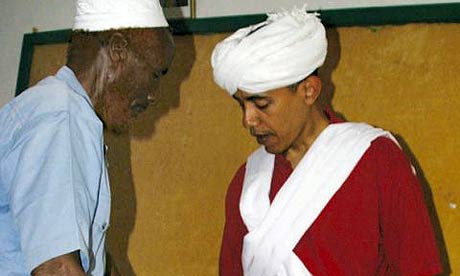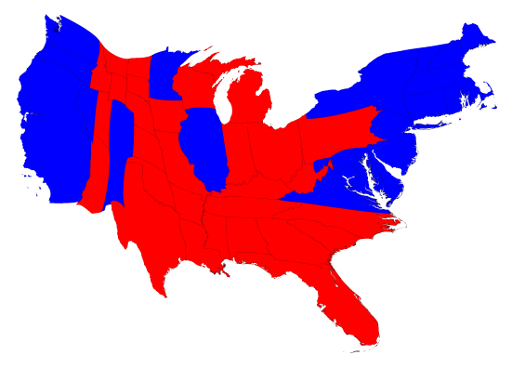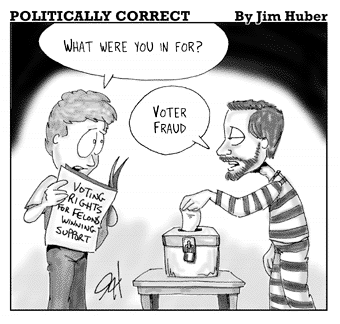Today was Election Day, when we celebrate puny particles with negative charges whizzing around in a cloud of quantum uncertainty about a nucleus of massive, positive particles bulked up with neutral particles of no charge, or bureaucrats. Unless they are waves.
No, wait.
Elections, not Electrons. Sorry.
Heeding the old Chicago adage to Vote Early and Often, the sundry strongholds of
Clan na Fhloinn struggled into action as Rosy-fingered Dawn diddled us this morning with the most remarkable choice since the Crook vs. the Naïf, back in 1972.
The American People want to know if their President is a Crook, the Crook once declared, and assured us the he was not with all the sincerity that a later president would assure us that he did not have sexual relations with that young woman. At least that later president had had the perspicacity not to discuss the matter on tape.
Speaking of which,
this video refers to an earlier campaign that we would now like to think was more genteel.
Early this morning, Daughter of TOF (DOTOF) texted the Incomparable Marge saying that she might need a ride to work because the line at the polling place was longer than a TOFian reminiscence. Apparently Granddaughter of TOF (SAMBBITU) was still nursing a hurt over the Bern and his endorsement of the Wall Street toady vis a vis the Wall Street toad and intended to sit this one out. Who knows. She still has to EOB today to change her mind. There ought to be a ballot choice labeled "I abstain" to distinguish such voters from those who simply forgot or didn't care.
In any case, DOTOF got through the line faster than the Incomparable Marge got out the door, so that at least we were spared. But when we got to the South Side Neighborhood Center, the throbbing heart of democracy on the cliffs above the Lehigh, we found the parking lot parked up. (It was nice to see
something knew what it was supposed to do.) And the streets around the Center, too.
The path from the parking lot was lined with campaign sign, which someone had taken the trouble to arrange with Democrats to the left and Republicans to the Right. TOF wondered if these signs have ever changed anyone's mind as he or she walked to the polling place.
The path to the door in the rear of the Center, where the voting traditionally takes place, was newly paved and widened; and a good thing, too, since the line was out the door and along the path. Nor did it get any shorter. As people did their business and departed, others came to take their place.
A front loader rolled past and dumped a load of dirt onto a pile. TOF believed this to be a post-modern commentary on the entire election, perhaps an "installation" of "performance" "art."
There was a millennial fellow ahead of TOF who wore, backward in the approved style, a baseball hat admonishing America to get great again. Behind TOF, was a burly fellow with a gray-white Santa Claus beard wore a similar hat celebrating the 82nd Airborne. His jacket, from which both sleeves had been ripped, exposed a tattoo of the shoulder patch of the 82nd permanently etched just where it should have been. By this, TOF understood he took some pride in his service.
There were others in line or emerging from the building. A white guy in a mechanic's uniform and the logo of a trucking company; a black guy in similar garb. An Indian couple elegantly dressed in kurta and pyjama with a look of pride and satisfaction on their faces. An elderly black woman walking with the aid of a cane -- tottering, really -- was escorted past everyone else. When they reached the millennial in the Trump cap, he stepped back and graciously let her pass.
Inside the Center, the line snaked past the Books and zig-zagged to the booths. The procedure hereabouts is that you print your name on a slip of paper in the indicated boxes and present it to the first person. She records you in a registration book and writes a voter number on the slip. TOF was the 353rd voter in the ward to have entered today. The Judge of the Election mentioned to the waiting voters that the number so far entered exceeded the grand total of all voters who had showed up for the primaries earlier in the year. TOF suspects it exceeded the total in previous general elections, since the clerks of the Election commented that never had they seen so many voters, ever.
At the next book, the clerk checked the name against the voter registration list and TOF countersigned by his name. He noted that his aged father had already voted. One woman kept trying to show her driver's license but the clerk insisted she did not need to see it.
But I have to show this to do just about anything else. Another woman was voting for the first time and was receiving instruction on how to use the 'touch screen' equipment. A third woman could not be found in the Register and had to pass over to another table. She, TOF overheard, was in the wrong place. Her ward, which had previously voted at the old junior high was now shifted to the elementary school. This had happened since the previous general election, two years ago. They made sure she knew where the elementary school was and she left.
This explains why the Incomparable Marge was assigned a lower number than TOF. Such names had been whited out in the numerical list, and they must leave no blanks.
In addition to the clerk who was resetting the machines after each voter, there was a Pennsylvania Constable standing by and assisting. Neither city police, county deputies, nor state troopers, the
Constables are a group perhaps unique to the Commonwealth:
elected peace officers. Constables are charged by Pennsylvania statute with maintaining order at election polls and ensuring that no qualified elector is obstructed from voting.
Constables are the only peace officers permitted at the polls on Election Day. In fact this duty is
mandated upon constables; failure to protect the polls, or provide for their protection through appointed deputies, is punishable with a fine.
As each voter left the booth, he or she was thanked by the Judge of the Election, by the Constable, or other official. There were stickers one could take and wear proclaiming
I VOTED. (Back in colonial days, the county clerk would announce in a loud voice, "(NAME) HAS VOTED!" Voting was a communal activity hard to capture in vote-by-mail.)
All told, the degree of amiable and neighborly behavior was a marked contrast to the ugly behavior of those at the heads of the two main tickets. The American people, TOF is convinced, are better than their leaders.
In addition to the Harpy and the Narcissist, the ballot featured a few other candidates: the Libertarian, Green, and Constitution parties and Write-In. Colorado, by contrast, has 22 different candidates. The Libertarian, Gary Johnson, is delightfully clueless. When asked to name his favorite foreign leader, he drew a blank. But asking a libertarian to name his favorite foreign leader is like asking a vegan to name his favorite cut of steak. He also apparently failed to recognize Aleppo, perhaps because he regarded foreign entanglements as none of our business. Still, one ought at least recognize what's going down in the world.
Of the Green candidate, neither her hide nor her hair has been seen on the news. Perhaps there is fear that she might become the Ralph Nader of 2016 and pull votes away from the Media Fave.
There seems to be a significant chance that Utah's electoral votes may go to an Independent Candidate. Evan McMullen has been consistently outpolling Clinton and runs neck-and-neck with Trump.
Meanwhile, back in the Commonwealth.
In the 2012 election, the three Pennsylvanias are relatively clear. The Democrats own Philadelphia (the deep blue county in the lower right) and the Main Line. They also have a stronghold in Pittsburgh (the lighter blue on the left, center). The difference is that Philadelphia and the Main Line are socially liberal while Pittsburgh is old style blue-collar union people who are more interested in economic issues than in, say, social engineering. More often than not, they "cling to their guns and bibles," as Obama put it. The other blue outposts are former manufacturing centers like Erie, W/B-Scranton and the Lehigh Valley (who are more attuned with Pittsburgh) and University (Centre County, in the center) and Government (Dauphin County: Harrisburg, the State Capitol). These are more aligned with Philadelphia. Lately, the lighter blue areas have been experiencing a red shift.
Philadelphia is the key. It is a significant percentage of the total voting population and went for Obama 85-14%. Obama's vote in Philadelphia was 10% of all votes cast in PA that year; so the question is whether Ms Clinton can pull off the same kind of margin this year. The most recent string of polls show her leading, but by very small margins within the bounds of sampling error (assuming no effect from non-response and other non-random factors).
I see the media have already started declaring winners in a few states. Good thing we have them or we'd have to wait for someone to actually count the ballots. Good thing they would never shade their projections.
























 Click the map to create your own at
Click the map to create your own at 








